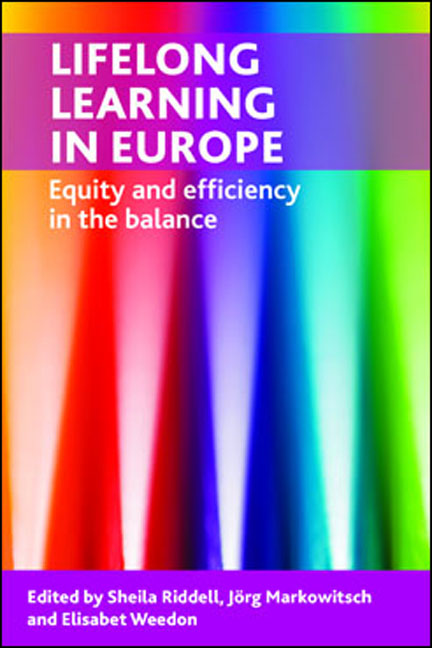Book contents
- Frontmatter
- Contents
- List of figures, tables and case studies
- Notes on contributors
- List of contributors, by country, to the EU Sixth Framework Project ‘Towards a Lifelong Learning Society in Europe: The Contribution of the Education System’ (LLL2010)
- one Lifelong learning and the generation of human and social capital
- two Lifelong learning and the wider European socioeconomic context
- three Neoliberal and inclusive themes in European lifelong learning policy
- four Formal adult education in the spotlight: profiles, motivations and experiences of participants in 12 European countries
- five The sociodemographic obstacles to participating in lifelong learning across Europe
- six The qualification-providing enterprise? Support for formal adult education in small and medium-sized enterprises
- seven Reducing or reinforcing inequality: assessing the impact of European policy on widening access to higher education
- eight Conclusion: the role of lifelong learning in reducing social inequality at a time of economic crisis
- Technical annex to Chapter Four
- Glossary of terms and abbreviations
- Index
two - Lifelong learning and the wider European socioeconomic context
Published online by Cambridge University Press: 01 September 2022
- Frontmatter
- Contents
- List of figures, tables and case studies
- Notes on contributors
- List of contributors, by country, to the EU Sixth Framework Project ‘Towards a Lifelong Learning Society in Europe: The Contribution of the Education System’ (LLL2010)
- one Lifelong learning and the generation of human and social capital
- two Lifelong learning and the wider European socioeconomic context
- three Neoliberal and inclusive themes in European lifelong learning policy
- four Formal adult education in the spotlight: profiles, motivations and experiences of participants in 12 European countries
- five The sociodemographic obstacles to participating in lifelong learning across Europe
- six The qualification-providing enterprise? Support for formal adult education in small and medium-sized enterprises
- seven Reducing or reinforcing inequality: assessing the impact of European policy on widening access to higher education
- eight Conclusion: the role of lifelong learning in reducing social inequality at a time of economic crisis
- Technical annex to Chapter Four
- Glossary of terms and abbreviations
- Index
Summary
Introduction
The aim of this chapter is to examine the relationship between lifelong learning systems and the wider socioeconomic context in which they are located at national and European levels. We describe the growth of economic inequality across much of Europe, which has coincided with the emergence of the knowledge economy. As demonstrated by Wilkinson (1996), Wilkinson and Pickett (2009) and Green and Janmaat (2011), countries with higher levels of inequality are much more prone to a range of problems associated with loss of trust and weak social cohesion. Education and lifelong learning are often charged with ameliorating these problems, but there are questions about the extent to which education can compensate for social and economic inequality. At the same time as common economic trends can be identified across all European countries, with knock-on effects for welfare regimes and systems of lifelong learning, there is also great variation between individual countries and groups of countries. As noted by Green et al (2007), one of the central debates within the literature on globalisation concerns the extent to which there is a growing trend towards the homogenisation of national cultures, reflected, amongst other things, within national systems of education and lifelong learning. An alternative view is that nation states, as a reaction to globalisation, may seek to intensify their cultural differences that are reflected strongly within education systems. Over recent years, through the Open Method of Coordination, the EU has sought to encourage member states to harmonise their education and lifelong systems with a view to facilitating the free movement of labour across national boundaries (see Chapter Three for further discussion). Understanding the similarities and differences between national systems as they react to global economic forces is therefore important in assessing progress towards a single harmonised system of European lifelong learning, particularly within the context of the ongoing economic crisis that may engender a less, rather than a more united Europe.
This chapter is underpinned by an understanding that different varieties of capitalism (Hall and Soskice, 2004), reflected in different approaches to social welfare and lifelong learning, are critical in facilitating or discouraging participation in lifelong learning. Adults who are motivated to learn will only be able to do so if systems and support are in place to facilitate their return to education after a break (Green et al, 2007; Rubenson and Desjardins, 2009).
- Type
- Chapter
- Information
- Lifelong Learning in EuropeEquity and Efficiency in the Balance, pp. 17 - 38Publisher: Bristol University PressPrint publication year: 2012



